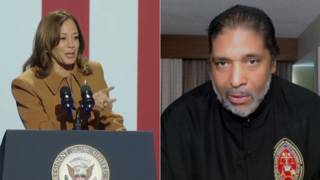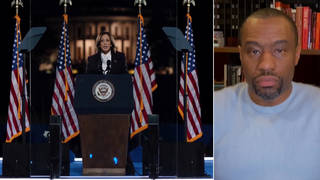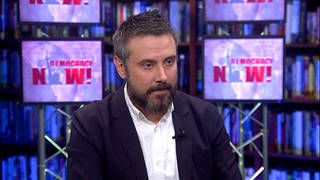
Related
Guests
- Wolfgang Kaleckfounder and general secretary of the European Center for Constitutional and Human Rights.
Editor’s Note: ProPublica has retracted part of its reporting–which we cited in our coverage–about Gina Haspel’s role at a secret CIA black site in Thailand where prisoners were tortured. ProPublica is now reporting Abu Zubaydah was waterboarded at the site before Haspel took over. According to the New York Times, Haspel did oversee the waterboarding of another prisoner, Abd al-Rahim al-Nashiri, at the secret prison.
On Tuesday morning, President Trump fired Secretary of State Rex Tillerson via Twitter. In the same tweet, the president announced CIA Director Mike Pompeo, who is a close ally of the Koch brothers, would be nominated to become the new secretary of state. Trump also tapped CIA Deputy Director Gina Haspel to head the CIA. Haspel was directly involved in the CIA’s torture program under George W. Bush. She was responsible for running a secret CIA black site in Thailand in 2002 where one prisoner was waterboarded 83 times and tortured in other ways. Both Mike Pompeo and Gina Haspel must now face Senate confirmations, but barring any Republican defections, both can be confirmed without any Democratic support. Last year, the European Center for Constitutional and Human Rights asked German prosecutors to issue an arrest warrant for Haspel for her role in the torture program. For more, we speak with Wolfgang Kaleck, founder and general secretary of the European Center for Constitutional and Human Rights.
Transcript
AMY GOODMAN: We begin today’s show looking at the latest shake-up in the Trump administration. On Tuesday morning, President Trump fired Secretary of State Rex Tillerson via Twitter. In the same tweet, the president announced CIA Director Mike Pompeo, who is a close ally of the Koch brothers, would be nominated to become the new secretary of state. Trump also tapped CIA Deputy Director Gina Haspel to head the CIA. Haspel was directly involved in the CIA’s torture program under George W. Bush. She was responsible for running a secret CIA black site in Thailand in 2002 where one prisoner was waterboarded 83 times and tortured in other ways. On Tuesday, President Trump praised Pompeo and Haspel.
PRESIDENT DONALD TRUMP: I’ve worked with Mike Pompeo now for quite some time. Tremendous energy, tremendous intellect. We’re always on the same wavelength. The relationship has been very good. And that’s what I need as secretary of state. I wish Rex Tillerson well. Gina, by the way, who I know very well, who I’ve worked very closely, will be the first woman director of the CIA. She is an outstanding person who also I have gotten to know very well.
AMY GOODMAN: Both Mike Pompeo and Gina Haspel must now face Senate confirmations, but barring any Republican defections, both can be confirmed without any Democratic support. The hearing will mark the first time Haspel has been forced to speak publicly about her role in the U.S. torture program and the destruction of CIA tapes documenting the torture.
Her nomination has been widely criticized by human rights groups. The American Civil Liberties Union called on the CIA to declassify and release every aspect of Haspel’s torture record before her nomination is considered. Last year, German prosecutors were asked to issue an arrest warrant for Haspel for her role in the torture program. Prosecutors are said to be reviewing the request by the European Center for Constitutional and Human Rights.
We begin today’s show in Berlin, Germany, where we’re joined by Wolfgang Kaleck, founder and general secretary of the European Center for Constitutional and Human Rights.
Wolfgang Kaleck, welcome back to Democracy Now! Can you explain why you are requesting an arrest warrant for the woman that President Trump has just tapped to be the director of central intelligence? She is currently deputy director.
WOLFGANG KALECK: Good morning, Amy. We have to stop the lying around torture. Torture—those who torture promise security; they create insecurity. They destroy human beings. And therefore, torture is one of the crimes of the crimes. So, everywhere in the world, torture should be investigated and prosecuted.
So, in the U.S., there have been systematic torture since 9/11, conducted under President Bush. And then, under President Obama, it was decided not to investigate and prosecute it. Therefore, there is no justice in the U.S. And the result is now the decision of President Trump to employ Gina Haspel, first as a deputy director and now as the director.
And this is where we Europeans come in, because torture has to be prosecuted everywhere in the world. We have a number of laws in Europe. And we used these laws in the last 15 years to file numerous criminal complaints in numerous jurisdictions against the torturers of the U.S. And as you know, in some cases we were more, and in other cases we were less successful. But the interesting result of our network’s legal work is that the torturers of the U.S. are not untouchable anymore. They have to take care where to travel and where not.
AMY GOODMAN: Can you explain why you have zeroed in on Gina Haspel, why you are requesting an arrest warrant for her, in particular?
WOLFGANG KALECK: We decided to target her, in particular, last year, when she was employed as the deputy director, because as a deputy director, she is traveling a lot around the world. And therefore, we think it’s important that the justice—the judicial authorities in Germany, but also in other European countries, make—try to investigate her role in Thailand and elsewhere, and that they are prepared, if Gina Haspel travels to our countries, that they eventually arrest her. And we also will have to communicate now, as she’s director, to our foreign offices, not only in Germany, but also in other countries, to declare her persona non grata, so that she isn’t invited to our countries because she is a notorious torturer, and notorious torturers shouldn’t be allowed to travel freely through Europe.
AMY GOODMAN: Talk about her record. There might be many in the United States who are surprised to hear you talking about Gina Haspel, the deputy director of the CIA, possible director, as a notorious torturer.
WOLFGANG KALECK: Yeah, it’s nothing new about that. I mean, she was one of the most prominent persons in the Senate torture report from December 2014. So, she was mainly acting undercover, but because of the revelations in 2014, we could connect her name with some of the other evidence we have. And so, therefore, it was clear that she played a prominent role in the CIA extraordinary rendition program, which is—yeah, it’s a torture program. It’s a kidnapping and torture terrorism suspects. And, I mean, we singled her out because of her prominent role in the new government, but we could also have named hundreds of other CIA employees, and we did so in other occasions. So, this is not the first complaint. We were active in Belgium, in France, in Spain, in Switzerland and in Germany before. We filed complaints against Donald Rumsfeld, against the lawyers, but also against George Tenet and other CIA people.
AMY GOODMAN: I want to read to you from an article written by Ray Bonner, the former New York Times reporter, in ProPublica about Gina Haspel’s role in the torture of Abu Zubaydah at a secret jail in Thailand where she was chief of base. Bonner writes, quote:
“During one waterboarding session, Zubaydah lost consciousness and bubbles began gurgling from his mouth. Medical personnel on the scene had to revive him. Haspel allowed the most brutal interrogations by the CIA to continue for nearly three weeks even though, as the cables sent from Thailand to the agency’s headquarters repeatedly stated, 'subject has not provided any new threat information or elaborated on any old threat information.'
“At one point, Haspel spoke directly with Zubaydah, accusing him of faking symptoms of physical distress and psychological breakdown. In a scene described in a book written by one of the interrogators, the chief of base came to his cell and 'congratulated him on the fine quality of his acting.' According to the book, the chief of base, who was identified only by title, said: 'Good job! I like the way you're drooling; it adds realism. I’m almost buying it. You wouldn’t think a grown man would do that.’”
Again, those the words of Ray Bonner, writing about Gina Haspel, and he was writing for ProPublica.
WOLFGANG KALECK: Yeah. Thank you very much for that quote. We could continue to quote even official sources, the Senate torture report, where the torturing of Abu Zubaydah is really detailly described.
And you have to know that the European Court of Human Rights in Strasbourg, the highest court in Europe, condemned Poland for Abu Zubaydah’s torture in Poland. So, unfortunately, the European Court was not competent to judge the U.S. role; therefore, we are calling the criminal courts.
But it’s a clear thing: What happened to Abu Zubaydah is torture, is a crime, or, in the alternative, of crimes against humanity or as a war crime. And so, many judicial bodies all over Europe can take up this case and follow it, because it’s so well documented. And that is also something important, that we have someone who’s nearly tortured to death, Abu Zubaydah, and we have at least one person identified who played a prominent role in his torturing. And therefore, we have the crime, we have the evidence, and we have jurisdiction. So the only thing what is missing right now is that Gina Haspel travels to one of our countries, and then the judicial authorities have to act.
AMY GOODMAN: But the arrest warrant has to be issued.
WOLFGANG KALECK: Look, the arrest warrant can be issued when she arrives somewhere and leaves the airport. But let’s clarify one thing: This is not about arrest warrant or no arrest warrant. Of course, we ask for an arrest warrant, but we have to ask for much more. I mean, the danger is now that a person who played a prominent role in the torture system of President George W. Bush will use the same methods in future. And so, the message has to be: We have to stop torture. And that means that our governments here in Europe and our judicial authorities do everything possible to communicate to President Trump and the rest of his government that notorious torturers aren’t allowed in this function to enter Europe.
I know that it’s a difficult task, but the good thing is, we don’t know—we don’t know the results of the judicial investigations in the numerous countries I just mentioned. But they, the Gina Haspels, also don’t know the results of this investigations. And I think that is a progress, and that is due to the engagement of so many rights groups all around the world and so many journalists and people who wrote about this system, that we revealed the fact of the extraordinary rendition torture system. And therefore, it’s also what we always said: It’s a long-distance run. It’s a long-distance run. But you can see from Latin American examples that, you know, notorious torturers feel safe because they were kind of sure that impunity lasts forever. But this is not the case in nowadays world. And so, maybe this year, maybe next year, she is going to face serious trouble, political trouble, but also trouble with the legal authorities. And that is our task, to maintain this level of troublemaking.
AMY GOODMAN: Wolfgang Kaleck, we want to thank you for being with us, founder and general secretary of the European Center for Constitutional and Human Rights, speaking to us from Berlin, Germany, where he’s based.
When we come back, a roundtable discussion on the Trump administration shake-up. We’ll speak with John Kiriakou, who spent 14 years at the CIA, was an analyst and case officer. We’ll ask why he and others called the new designate to head the CIA “Bloody Gina.” We’ll also speak with investigative journalist Jeremy Scahill of The Intercept and Lee Fang of the same news organization. Stay with us.













Media Options